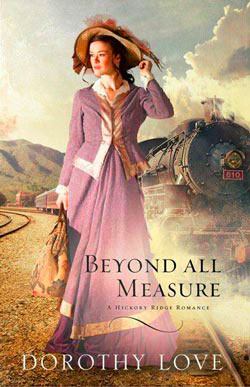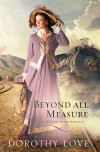Today is a bit of a first on the blog as I introduce the first novel I have reviewed here by Susan May Warren. This is not my first Warren book, however; but my first historical.
A little about Susan May Warren, one of the best-loved writers in the Christian market:
Susan May Warren is an award-winning, best-selling author of over twenty-five novels, many of which have won the Inspirational Readers Choice Award, the ACFW Book of the Year award, the Rita Award, and have been Christy finalists. After serving as a missionary for eight years in Russia , Susan returned home to a small town on Minnesota ’s beautiful Lake Superior shore where she, her four children, and her husband are active in their local church.
Susan's larger than life characters and layered plots have won her acclaim with readers and reviewers alike. A seasoned women’s events and retreats speaker, she’s a popular writing teacher at conferences around the nation and the author of the beginning writer’s workbook: From the Inside-Out: discover, create and publish the novel in you!. She is also the founder ofwww.MyBookTherapy.com, a story-crafting service that helps authors discover their voice.
Susan makes her home in northern Minnesota , where she is busy cheering on her two sons in football, and her daughter in local theater productions (and desperately missing her college-age son!)
The Heiress is the first historical novel I have read by Susan May Warren. Similar to the award-winning novel, She Walks in Beauty by Siri Mitchell, The Heiress is set in the Gilded Age and features a heroine torn between her high society standing and recognizing the tarnished edges beneath the sheen of society’s gloss.
 Retelling the story of Jacob and Esau, the novel (the first in the Daughters of Fortune trilogy) spins the tale of high-spirited Esme: the eldest daughter, the first to lay claim to birthright. Esme follows closely the news unraveling in the tenements and the slums of the cities and remains captivated by the surge of female journalists way-laying their traditional domestic role and by the photos of social documenter Jacob Riis. Esme is desperate to rip away from her father’s newspaper empire and craft a journalist’s life of her own: leaving parties and corsets behind.
Retelling the story of Jacob and Esau, the novel (the first in the Daughters of Fortune trilogy) spins the tale of high-spirited Esme: the eldest daughter, the first to lay claim to birthright. Esme follows closely the news unraveling in the tenements and the slums of the cities and remains captivated by the surge of female journalists way-laying their traditional domestic role and by the photos of social documenter Jacob Riis. Esme is desperate to rip away from her father’s newspaper empire and craft a journalist’s life of her own: leaving parties and corsets behind.
Jinx, the youngest, envies her sister’s birthright: most so when a devastating family secret looms near enough to prove she should have right of succession. Beguiled by parties, social outings and the near-looming presence of the wealthy match intended for her elder sister, Jinx wallows in envy: learns the ways of a social flirt and excels at being the opposite to Esme’s social conscious and moral compass.
No two sisters could be more unlike and yet when their separate plots spin wayward, we begin to realize the similarities in their passions, love and plights. While Esme loves the butler’s son, Oliver: a ruffian who lives in Hell’s Kitchen to better understand and unmask the social depravity therein; Jinx falls in love with a man forbidden her: an emblem of wealth and prosperity made problematic due to the care and attentiveness Jinx is unused to and its clash with her own sense of worthlessness.
Family secrets, violence, underhanded deeds and the claim on birthright propel the story in a fast-paced waltz symbolic of the lavish gatherings these characters populate.
I couldn’t help but think of Downton Abbey or the Foryste Saga while reading this family soap opera. There is high melodrama here including a rather poorly set up case of mistaken identity in a nightly tryst : it was questionable moments like this that not only made me feel less and less empathy for the lead characters; but also recalled some of Tracie Peterson’s dime-novel tactics (remember the evil/good twins Chase and Jayce in one of the Alaska series?).
I have read a contemporary chicklit of Warren’s and found it rather diverting and pleasant and plotted out. I count the aforementioned questionable writing methods as rookie mistakes in the historical vein and have high hopes for the series; for I really think she has enough of the captivating story-teller about her to smooth out any glitches in subsequent novels. Thus, I do recommend this book highly, despite its inaugural hiccups.
As mentioned, I found the characters in the novel very hard to empathize with: made more so by the penchant the author has for intruding with historical detail that does not ingrain itself with verisimilitude or sensibility; rather is mushed into dialogue: choppy and uneven. By mid-novel complaints I had of pages and pages of set-up dialogue (often terse, loquacious and inserted as a method of double, no, triple checking that we followed what period she was writing in and the idiosyncrasies therein) tapered off slightly and Warren found her stride.
So, we are told rather than shown of Esme and Jinx’s conflicting beliefs, of their opposing natures and, near middle, of their similar circumstance. Warren does well at pitting one against society while showing the other’s weakness at the prospect of losing the comfortable lifestyle she is accustomed to.
I must give an upgrade to the book due to the winsome heroes: Bennett, Jinx’s eventual suitor, is a kind and flawed man who sees the worth beyond her family fortune and upscale name. Oliver holds a torch for Esme for years and watches in periphery as she is catapulted into a life expected by her family.
This is high melodrama; but I do commend Warren on her spicy and sensual approach to the relationships painted in the novel. There is moral fibre, yes, but not at the expense of humanity. Not unlike Laura Frantz's portrayal of young and vibrant physical relationships and passion in Courting Morrow Little, as one example. I enjoy that Warren infuses her work with this vitality and, even though her fiction is set in a Christian sphere, I find this enhances its believability and readability.
I appreciate the rather passionate undertones of the book and Warren’s knack for description. She has a way of alluding to the physical in a few, slight words and the book, at times, and given its spicy tone, is well-handled by her talent: leaving you with just enough to paint in the imaginative blanks in your mind’s eye. I only wish this, one of her obvious strengths, was the same measure taken when painting her historical canvas.
The first in a series full of danger, mystery, social conditioning, tangled love, secrets and betrayal--- enough to make me want to follow through the end and to lose myself in the escapist world of horseless carriages, crinoline and afternoon tennis matches, yachts and dinner parties once more.
I'll be checking out more of Susan May Warren's books and I hope you do, too!
Make sure you check out Susan's blog here
Also, AWESOME contest care of LITFUSE: make sure you visit their website for details: Enter to win an opulent Gilded Age prize pack fit for an heiress in Susan May Warren’s fun giveaway ($100 to ModCloth.com, iPod Shuffle, Pearls, Titanic, Music & More!)!
There, you will also find the listings for the full blog tour so that you can read what others think about The Heiress!
My thanks to Litfuse for allowing me to take part in this exciting tour and for the copy of this exciting new novel!
 The beginning of the novel will remind readers of Victoriana of Anne Bronte's The Tenant of Wildfell Hall: a young woman runs, this time with her young brother, from the beatings of her abusive husband. Here, a Civil War vet named Harlan determined to ensure his wife's untimely demise. Unsure where to find work or sustenance, Katie providentially runs into Robert Foster, the foreman of a Michigan logging company where a good cook is immediately needed. Katie's tenacious spirit and talent in the kitchen find her a perfect match for the voracious loggers.
The beginning of the novel will remind readers of Victoriana of Anne Bronte's The Tenant of Wildfell Hall: a young woman runs, this time with her young brother, from the beatings of her abusive husband. Here, a Civil War vet named Harlan determined to ensure his wife's untimely demise. Unsure where to find work or sustenance, Katie providentially runs into Robert Foster, the foreman of a Michigan logging company where a good cook is immediately needed. Katie's tenacious spirit and talent in the kitchen find her a perfect match for the voracious loggers.

















